Photographs: Reuters BS Reporter in Mumbai
In response to the West Bengal legislative assembly approving the new government's Bill taking away the entire land at Singur allotted to Tata Motors' stillborn Nano car factory, the company said the legislation fails to state why the project had to be moved out of West Bengal.
. . .
Recall why we left Singur: Tata Motors
Image: Tata Motors chairman Ratan Tata (left) poses with Nano car.Photographs: Punit Paranjpe/Reuters
The legislation revokes the original lease agreement signed between Tata Motors, the country's biggest automobile maker, and the West Bengal Industrial Development Corporation.
The Mumbai-based company said it would study the enactment and take appropriate steps.
Tata Motors had set up the plant at the invitation of the then Left Front government led by Buddhadeb Bhattacharjee.
. . .
Recall why we left Singur: Tata Motors
Image: Tata Motors security personnel and policemen stand guard at Singur factory.Photographs: Dipak Chakraborty
It was to have initially directly employed 2,000 persons and, in a cascading manner, creating in excess of 10,000 jobs among the vendors and service providers in the vicinity of the plant, the company stated.
"The Bill mentions 'non-commissioning and abandoning' of the project by Tata Motors and goes on to state that 'no employment generation and socio-economic development has taken place and people in and around the area have not benefited in any manner . . .'
The Bill does not state the reasons for stoppage of operations and shifting of the plant," stated a release.
. . .
Recall why we left Singur: Tata Motors
Image: Mamata Banerjee takes part in a rally in Singur.Adding: "Tata Motors wants to clarify that the operations of setting up and commissioning of the plant was conducted under very difficult conditions, amidst violence, disruption of activities, damage to property, threats to personnel.
"An appeal was made on August 22, 2008, for a congenial environment, which was rebuffed with an escalation of hostilities through a blockade on the highway, more incidents of physical assault and intimidation of personnel.
. . .
Recall why we left Singur: Tata Motors
Image: Ratan Tata.Photographs: Reuters
"Therefore, Tata Motors did not find the situation congenial to continue its operations and, there being no guarantee of a safe and peaceful environment, had to reluctantly close operations on October 3, 2008, and eventually moved out."
Tata Motors had invested nearly Rs 1,800 crore (Rs 18 billion) in establishing the plant.
All the equipment had been installed in the plant and trial production of the Nano had begun.
The company still has buildings, sheds and infrastructure on the plot, on which it has invested about Rs 440 crore (Rs 4.4 billion).
. . .
Recall why we left Singur: Tata Motors
Image: A farmer at a construction site in Singur.Photographs: Parth Sanyal/Reuters
As for the vendor park, 13 vendors had constructed plant buildings, while 17 others were at various stages of construction.
The vendors had invested about Rs 171 crore (Rs 1.71 billion).
One of the vendors involved stated, "Its good for all of us that an end has been put to this but we need appropriate compensation for the lost investment."
. . .
Recall why we left Singur: Tata Motors
Image: The abandoned plant of Tata's Nano in Singur.Photographs: Jayanta Shaw/Reuters
"In keeping with the tradition of the Tata Group, Tata Motors began a comprehensive community development programme at Singur in December 2006, even before the plant's construction began, comprising development of employability/self-employment of the community, health and education.
"Eventually, 767 individuals were trained. About 102 health clinics were run, treating 17,000 patients till the activity was forcibly stopped.
"Adjacent schools were supported with necessary infrastructure. Men and women in the area were supported to acquire means of self-employment," the Tata statement noted.

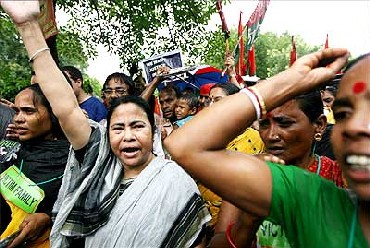
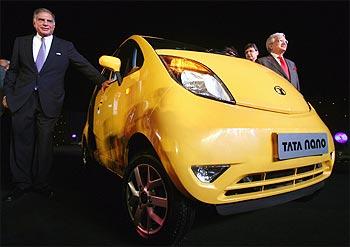
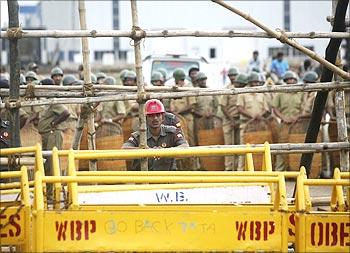
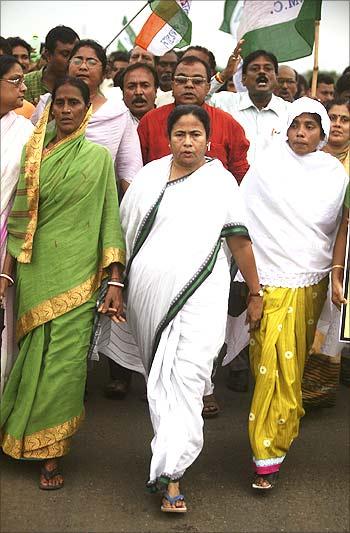
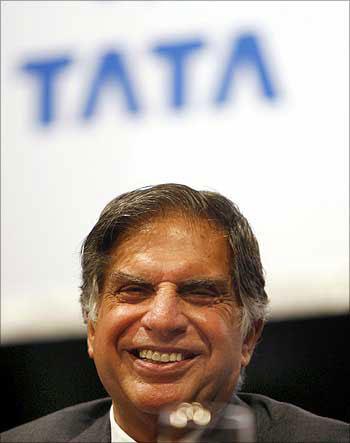
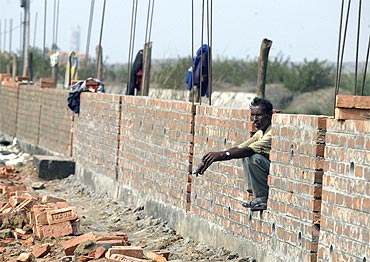
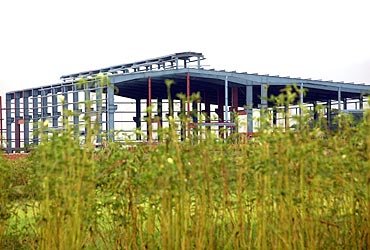

article